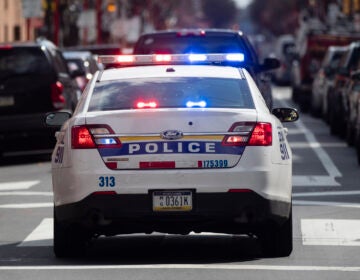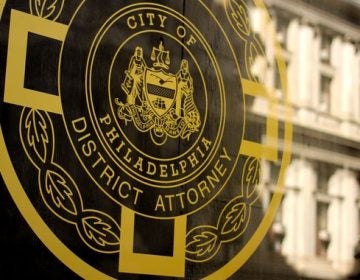Despite #MeToo solidarity, reports of sex assault falling in Philly
City police statistics show nearly 1,100 cases of rape were reported in 2017, a 6 percent decline over the previous year.

Participants march against sexual assault and harassment at the #MeToo March in the Hollywood section of Los Angeles on Sunday, Nov. 12, 2017. (Damian Dovarganes/AP Photo)
Despite the #MeToo movement causing a wave of allegations against high-profile men around the country, the number of reported rapes in Philadelphia is falling.
City police statistics show nearly 1,100 cases of rape were reported in 2017, a 6 percent decline over the previous year.
Authorities suggest fewer rapes occurred last year. But experts who work with survivors of sexual assault and those who study sex crimes argue the accounts that have toppled bad-behaving men in high places have not yet empowered everyday women to expose their attackers.
“The average woman isn’t Taylor Swift. She doesn’t walk into a police station a beloved, blond millionaire,” said Margo Kaplan, a law professor at Rutgers University who specializes in sex crimes.
“She’s maybe a single mother who was raped by a boyfriend with whom she had an on-and-off relationship,” Kaplan said. “She might be a woman with an opioid addiction who got raped by her dealer. She might have a history of mental illness that a defense attorney can use against her.
“All these woman have been raped, but police are not necessarily going to believe them or respect them,” she continued. “And prosecutors are going to have a hard time building a case for them because juries are not going to like them,” she said.
Studies have long shown that rape and sexual assault are underreported. Recent research suggests that just a third of all sexual attacks are reported to police.
About 1,100 rapes were reported in the city in 2017, and police made 383 arrests, according to data provided by police. Some of those arrests, though, stem from years-old previously unsolved rape cases.
Sgt. Eric Gripp said officers do everything they can do to encourage rape victims to step forward, but he said those cases can be some of the most complicated to pursue.
“When people are a victim of a traumatic event — I don’t want to say their stories change, they’re afraid to come to court,” he said. “But oftentimes, these things happen.”
The pace of justice
Jennifer Storm, the victim advocate for the Commonwealth of Pennsylvania, is worried the #MeToo movement will have unintended consequences for survivors of sexual assault and rape. Because there has been rapid justice in many notable cases, she said, victims might anticipate a similar outcome after reporting an attack.
“That kind of accountability is not going to happen at their university or corporation or business, because I just don’t think we’re there yet,” Storm said. “And my concern is that we’re setting an unrealistic expectation.”
For most survivors, Storm said, disclosing sexual misconduct does not feel safe, or doing so could put someone’s financial security in jeopardy. And when an accuser does feel ready to stand up against an attacker, there is often a delay, a fact that Storm says could backfire during a trial in this moment.
“Now juries are going to say, ‘Wait a minute, we live in an era of Me Too, why didn’t you come forward, why didn’t speak up sooner?’ ” Storm said.
After the 2011 arrest of Jerry Sandusky on dozens of charges of sexually abusing young boys, Storm said there was an outpouring of sexual misconduct reports around the state, a surge that eventually tapered off. The falling number of reported rapes in Philadelphia could reflect that continuing decline, she said.
More likely, Storm said, is that most victims are still not comfortable with speaking out, even with the support of the #MeToo movement.
“People are not running to law enforcement. They’re not running to their local media. They’re not running to social media to express something so horrifically violating that happened to them,” Storm said.
Different story in NYC
In New York City, police logged a jump in reports of sexual attacks following the publication of accusations against Hollywood mogul Harvey Weinstein. Authorities there attributed the spike to the publicity generated by the Weinstein story.
Philadelphia rape reports jumped by 12 percent in October, when the Weinstein story broke. In November, the number significantly dipped.
“It could just be that more people decided not to report,” said Philadelphia Capt. Sekou Kinebrew. “As opposed to New York, where more people chose to report. But it could also be that fewer rapes actually happened in Philadelphia.”
Storm points out that just because victims are not going to law enforcement does not mean they are not seeking services, such as counseling, confidentially.
“Behind every one of those strong, brave voices, there are hundreds more who are in silence at this point because they are not safe to come forward,” Storm said. “Or they are not therapeutically at a point where they are ready to come forward and expose that.”
Kaplan said, despite newfound support, most women facing sexual assault feel like they are not going to be believed.
“Or she thinks she is going to be blamed for her rape,” Kaplan said. “Or she doesn’t want to go through the criminal justice system response to her sexual assault.”
WHYY is your source for fact-based, in-depth journalism and information. As a nonprofit organization, we rely on financial support from readers like you. Please give today.




